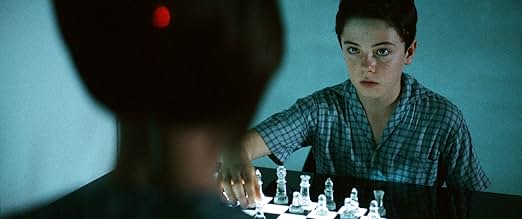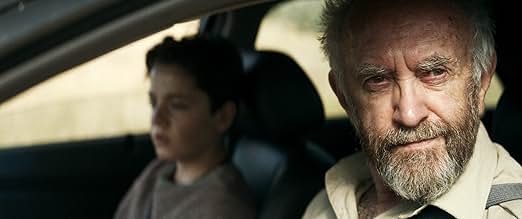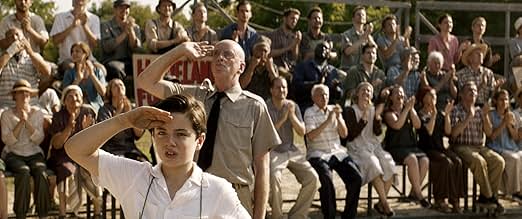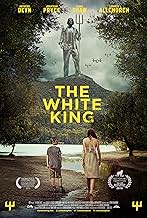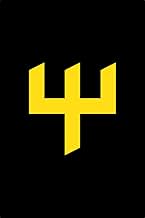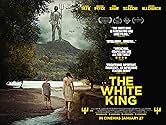AVALIAÇÃO DA IMDb
5,5/10
4,8 mil
SUA AVALIAÇÃO
Adicionar um enredo no seu idiomaA 12-year-old boy rebels after a brutal government labels his father a traitor and imprisons him.A 12-year-old boy rebels after a brutal government labels his father a traitor and imprisons him.A 12-year-old boy rebels after a brutal government labels his father a traitor and imprisons him.
- Direção
- Roteiristas
- Artistas
- Prêmios
- 11 indicações no total
Olivia Williams
- Sophia
- (narração)
Péter Bánó
- Silver Hair's Driver
- (as Bánó Péter)
Avaliações em destaque
This follows a family living in a totalitarian dystopia.
This is a hard film for me to review.
First off, its production is very good. The camera work and direction is great. The characters are very well constructed and the acting is absolutely top notch. The world is quickly and deftly painted using iconography and suggestion. The world is oppressive but not overly brutal making it feel more real and dangerous. I enjoyed every minute of the first hour greatly and was gripped to see what was going to happen.
Here is the problem. Not much does happen. This film has plenty of story, but hardly any plot. Characters are introduced, and adversities befall our leads, but very little is resolved or explored. Any small victories the characters win aren't exploited.
The only analogy I can think of is if you made a film about a waitress who works in a bar in Star Wars. Sure dancing girls are fed to monsters and Jedi come in - but at the end of the day you are still watching someone serve drinks.
Maybe it is my personal taste, I thought I was more open minded than this, but it seems I do need a certain degree of resolution.
I kept the mark high because of the quality of the film making - not sure if I would recommend it though.
This is a hard film for me to review.
First off, its production is very good. The camera work and direction is great. The characters are very well constructed and the acting is absolutely top notch. The world is quickly and deftly painted using iconography and suggestion. The world is oppressive but not overly brutal making it feel more real and dangerous. I enjoyed every minute of the first hour greatly and was gripped to see what was going to happen.
Here is the problem. Not much does happen. This film has plenty of story, but hardly any plot. Characters are introduced, and adversities befall our leads, but very little is resolved or explored. Any small victories the characters win aren't exploited.
The only analogy I can think of is if you made a film about a waitress who works in a bar in Star Wars. Sure dancing girls are fed to monsters and Jedi come in - but at the end of the day you are still watching someone serve drinks.
Maybe it is my personal taste, I thought I was more open minded than this, but it seems I do need a certain degree of resolution.
I kept the mark high because of the quality of the film making - not sure if I would recommend it though.
This is a low budget, low-action, dystopian recycled story, apparently filmed in or near Hungary, with good british acting. I don't recommend it, even to dystopia fans. It's STAND BY ME meets 1984 / HANDMAID'S TALE et al. There's little there, there.
I enjoyed this new film and also, as a small rule, I am generally really interested to see new directors'/producers work. Especially when the is a dearth of good stuff coming out of the established US/UK areas, well picked Edinburgh Film Festival!
It was interesting and although one can see allusions, references etc to established works such as Orwell, Huxley and so on - well they do say there are only 7 stories in the world! - this is a new take on it.
Loved the the boy lead actor, and Deyn (who I thought surprisingly good and natural) loved the cinematography and the story of a (particularly relevant today) dystopian society, there were others that also stood out, although I was a little surprised to see De Lint who I have not seen for a very long time on the big screen.
Moody and thought provoking with one or two touches of brilliance. Not perfect (a first film n.b.) but the fact that I was engaged throughout says it all.
It was interesting and although one can see allusions, references etc to established works such as Orwell, Huxley and so on - well they do say there are only 7 stories in the world! - this is a new take on it.
Loved the the boy lead actor, and Deyn (who I thought surprisingly good and natural) loved the cinematography and the story of a (particularly relevant today) dystopian society, there were others that also stood out, although I was a little surprised to see De Lint who I have not seen for a very long time on the big screen.
Moody and thought provoking with one or two touches of brilliance. Not perfect (a first film n.b.) but the fact that I was engaged throughout says it all.
Potential. But I think it failed to convert from the book into a film. The backdrop with violent kids just rampaging, and no one paying attention to that, to the ending that offered nothing. I have no idea what the film was wanting to achieve. I think they wanted to make this a triple series but maybe realised it was just weak material and gave up. either that or the editor is owed his or her $500 fee and withheld the last 20 minutes of the film.
Watch it or not it is one of those that won't make a difference. Sad really, had a lot of potential in there. I think you could have gone to 20 random people in the street and they could have made that 50% better
"They all will have to lose something. If not you are a traitor."
"The White King" takes place in a future society. Has there been a worldwide, destructive war? A deadly epidemic? Or did a world state succeed in shutting down global communication, after which they could conquer all the on high-tech depending countries by using conventional warfare? And after this invasion, did they install a totalitarian regime? You won't get any real answers to these questions. It looks like a hermetically sealed off camp with no luxury and limited basic needs. The regime can be called fascist. Even a sort of Hitler Youth is present. There's militaristic tradition to honor "The Homeland". The food supplies are managed according to strict rules. And apparently, each home is equipped with an intercom system where the daily production and practical information are announced. The Homeland is not a humanitarian society. It's a society where coercion, control and punishment are key words. And this under the eye of strategically placed surveillance cameras.
Djata (Lorenzo Allchurch) grows up in this commune. A continuing atmosphere of threat and oppression stands in the way of a carefree youthful life. Mischiefs are punished severely (with boxing irons). And when he tries to get a football back from some older bullies (probably sons of someone high in the military hierarchy), this turns into a violent fight rather than a kind of capture-the-flag game. In addition, his father is being arrested because of politically incorrect behavior. From then on, their live won't be made easy. Their freedom is restricted and certain necessities are taken away from them.
All this is taking place at the foot of an immense statue which can be compared (In terms of dimensions) with the Christ statue in Rio de Janeiro. But in appearance, it looks like an illustration from old Russia when Marxism ruled. This image appears to be a portrait of the dictator who created this community. However, don't expect further explanation about this. The symbolism used will obviously remind you of other past regimes. One regime stricter and more dictatorial than the other. Despite the attempts to create a teenage atmosphere with Djata searching for a treasure, him visiting his influential grandparents and a short-lived intermezzo in a futuristic-looking building outside the guarded area, the atmosphere in this movie remains gloomy and sinister. This is not a dystopian movie such as "The Hunger Games" or "Divergent" where a heroine overthrows the totalitarian regime. This is a rather cynical film about a not so unthinkable world in which human freedom is non-existent. To think that in our present world there are people who actually live in such humiliating circumstances.
The only actors who looked familiar to me, were Ross Partridge and Jonathan Pryce as Djata's father and grandfather respectively. However, their roles were rather limited (although of significance). It's mainly Lorenzo Allchurch and Agyness Deyn who deliver a brilliant performance. Allchurch's naive look at the society he's living in, is gradually being replaced by a determined attitude. It's not always high-quality, award-winning acting but admirable to play such an important role at such a young age. Deyn's part wasn't necessarily self-evident either. A caring mother who tries to protect her son and who would do everything to get her deported man back. The movie doesn't contain any magical and fascinating images full of special effects. There aren't any battle scenes with rebels trying to overthrow a regime either. The story is generally fairly superficial and vague. Certain scenes were quite unnecessary. Like the confrontation with General Meade. This was solely used to show that it all takes place in a distant future. The end is quite sudden and leaves you behind with tantalizing questions. In terms of mood the film is a success. A sober and compromising atmosphere that feels like a lifelike nightmare. A nightmare that nobody wants to experience in person.
More reviews here : http://bit.ly/2qtGQoc
"The White King" takes place in a future society. Has there been a worldwide, destructive war? A deadly epidemic? Or did a world state succeed in shutting down global communication, after which they could conquer all the on high-tech depending countries by using conventional warfare? And after this invasion, did they install a totalitarian regime? You won't get any real answers to these questions. It looks like a hermetically sealed off camp with no luxury and limited basic needs. The regime can be called fascist. Even a sort of Hitler Youth is present. There's militaristic tradition to honor "The Homeland". The food supplies are managed according to strict rules. And apparently, each home is equipped with an intercom system where the daily production and practical information are announced. The Homeland is not a humanitarian society. It's a society where coercion, control and punishment are key words. And this under the eye of strategically placed surveillance cameras.
Djata (Lorenzo Allchurch) grows up in this commune. A continuing atmosphere of threat and oppression stands in the way of a carefree youthful life. Mischiefs are punished severely (with boxing irons). And when he tries to get a football back from some older bullies (probably sons of someone high in the military hierarchy), this turns into a violent fight rather than a kind of capture-the-flag game. In addition, his father is being arrested because of politically incorrect behavior. From then on, their live won't be made easy. Their freedom is restricted and certain necessities are taken away from them.
All this is taking place at the foot of an immense statue which can be compared (In terms of dimensions) with the Christ statue in Rio de Janeiro. But in appearance, it looks like an illustration from old Russia when Marxism ruled. This image appears to be a portrait of the dictator who created this community. However, don't expect further explanation about this. The symbolism used will obviously remind you of other past regimes. One regime stricter and more dictatorial than the other. Despite the attempts to create a teenage atmosphere with Djata searching for a treasure, him visiting his influential grandparents and a short-lived intermezzo in a futuristic-looking building outside the guarded area, the atmosphere in this movie remains gloomy and sinister. This is not a dystopian movie such as "The Hunger Games" or "Divergent" where a heroine overthrows the totalitarian regime. This is a rather cynical film about a not so unthinkable world in which human freedom is non-existent. To think that in our present world there are people who actually live in such humiliating circumstances.
The only actors who looked familiar to me, were Ross Partridge and Jonathan Pryce as Djata's father and grandfather respectively. However, their roles were rather limited (although of significance). It's mainly Lorenzo Allchurch and Agyness Deyn who deliver a brilliant performance. Allchurch's naive look at the society he's living in, is gradually being replaced by a determined attitude. It's not always high-quality, award-winning acting but admirable to play such an important role at such a young age. Deyn's part wasn't necessarily self-evident either. A caring mother who tries to protect her son and who would do everything to get her deported man back. The movie doesn't contain any magical and fascinating images full of special effects. There aren't any battle scenes with rebels trying to overthrow a regime either. The story is generally fairly superficial and vague. Certain scenes were quite unnecessary. Like the confrontation with General Meade. This was solely used to show that it all takes place in a distant future. The end is quite sudden and leaves you behind with tantalizing questions. In terms of mood the film is a success. A sober and compromising atmosphere that feels like a lifelike nightmare. A nightmare that nobody wants to experience in person.
More reviews here : http://bit.ly/2qtGQoc
Você sabia?
- CuriosidadesThe film is based on György Dragomán's multiple award winning novel, but the story has been transposed to fictitious near-future dictatorship. Dragomán said this about the film: "In my original novel I wanted to show freedom in a society where freedom should not exist. In their movie Alex and Jörg were brave enough to take my communist childhood tale and adapt it into a modern story, showing us that the threat to freedom is as eternal as our fight for it."
- Erros de gravaçãoIn a close-up shot of Djata as he watches a time-lapse video of a city skyline, viewers see reflections of two lights in his eyes that don't match with reflections that would actually be seen from the video he's watching. In a closer shot a few seconds later viewers do see reflections of the video in his eyes.
Principais escolhas
Faça login para avaliar e ver a lista de recomendações personalizadas
- How long is The White King?Fornecido pela Alexa
Detalhes
- Data de lançamento
- Países de origem
- Centrais de atendimento oficiais
- Idioma
- Também conhecido como
- Белый король
- Locações de filme
- Hungria(Filmed Entirely on Location)
- Empresas de produção
- Consulte mais créditos da empresa na IMDbPro
Bilheteria
- Orçamento
- £ 2.000.000 (estimativa)
- Faturamento bruto mundial
- US$ 14.074
- Tempo de duração1 hora 29 minutos
- Cor
- Proporção
- 2.35 : 1
Contribua para esta página
Sugerir uma alteração ou adicionar conteúdo ausente








